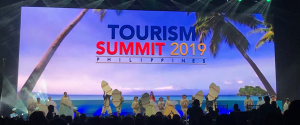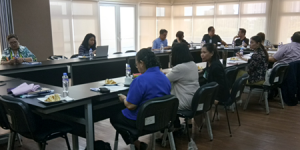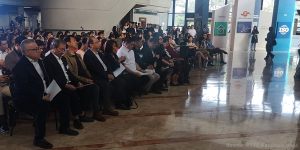 The Department of Tourism (DOT) in collaboration with Go Negosyo and other partners like the ASEAN Business Advisory Council, Department of Foreign Affairs, Tourism Board of the Philippines, Philippine Chamber of Commerce and Industry and the Filipino Chinese Chamber of Commerce and Industry , conducted the country’s First National Tourism Summit last 02 May 2019 held at the World Trade Center in Pasay City.
The Department of Tourism (DOT) in collaboration with Go Negosyo and other partners like the ASEAN Business Advisory Council, Department of Foreign Affairs, Tourism Board of the Philippines, Philippine Chamber of Commerce and Industry and the Filipino Chinese Chamber of Commerce and Industry , conducted the country’s First National Tourism Summit last 02 May 2019 held at the World Trade Center in Pasay City.
The summit focused on how to create a more integrated tourism industry not just in the Philippines, but across the ASEAN region. The goal is to achieve sustainable island tourism that will contribute to the socio-economic growth of the region. Speakers and experts from different countries shared their insights and best practices on how to achieve this goal.
As such, the country’s tourism industry was identified as one of the pillars for greater inclusive growth. The DOT is confident that there will be around 8.2 million tourists this year; a 15% increase from last year’s 7.1. million tourists. This signals an increased demand for products and services, which can be supplied by our entrepreneurs from different sectors, thus, contributing livelihood and sustainable income for more Filipinos.
As an inclusive sector, tourism extends not just to the services provided by airlines and travel agencies, but includes other industries such as culinary, retail, transportation, logistics, medical and agriculture. As tourism booms, more and more businesses can flourish and cater to the growing needs of travelers. Indeed, a boost in tourism is a boost in our economy- more tourists, more of the much needed revenue for the economy.
Hence, all kinds of businesses, whether micro, small or medium will gain from the sector’s inclusivity, including those in far flung tourist spots in the country. More diverse products, services as well as culture will be offered from these beautiful places in and around the country. GTM

 The Department of Tourism (DOT) in collaboration with Go Negosyo and other partners like the ASEAN Business Advisory Council, Department of Foreign Affairs, Tourism Board of the Philippines, Philippine Chamber of Commerce and Industry and the Filipino Chinese Chamber of Commerce and Industry , conducted the country’s First National Tourism Summit last 02 May 2019 held at the World Trade Center in Pasay City.
The Department of Tourism (DOT) in collaboration with Go Negosyo and other partners like the ASEAN Business Advisory Council, Department of Foreign Affairs, Tourism Board of the Philippines, Philippine Chamber of Commerce and Industry and the Filipino Chinese Chamber of Commerce and Industry , conducted the country’s First National Tourism Summit last 02 May 2019 held at the World Trade Center in Pasay City. Effective this year, exporters of products under the European Union (EU) Generalized System of Preference (GSP) – are required to be registered to the Registered Exporters System (REX).
Effective this year, exporters of products under the European Union (EU) Generalized System of Preference (GSP) – are required to be registered to the Registered Exporters System (REX). The Philippine Trade Training Center (PTTC) recently embraced its new role as the hub for Filipino innovators to produce “smarter” entrepreneurs through the soft launch of the Philippine Global MSME Academy. Moreover, a signing of a Memorandum of Agreement (MOA) between and among multi-stakeholder collaborators including the Department of Trade and Industry (DTI) and PTTC, Lead-More Development Inc., and other industry partners for the Integrated Center for Entrepreneurship (ICE) project was also done on 27 February 2019.
The Philippine Trade Training Center (PTTC) recently embraced its new role as the hub for Filipino innovators to produce “smarter” entrepreneurs through the soft launch of the Philippine Global MSME Academy. Moreover, a signing of a Memorandum of Agreement (MOA) between and among multi-stakeholder collaborators including the Department of Trade and Industry (DTI) and PTTC, Lead-More Development Inc., and other industry partners for the Integrated Center for Entrepreneurship (ICE) project was also done on 27 February 2019.

 “Since the inception of the industry-government-academe linkage, there is now greater participation and partnerships between companies and universities in the implementation of this reform at ground level.” This was reported by Mr. Sergio R. Ortiz-Luis, Jr., president of the Philippine Exporters Confederation (PHILEXPORT) and Vice-Chair of the Export Development Council (EDC), during the recently concluded 8th National Education Forum.
“Since the inception of the industry-government-academe linkage, there is now greater participation and partnerships between companies and universities in the implementation of this reform at ground level.” This was reported by Mr. Sergio R. Ortiz-Luis, Jr., president of the Philippine Exporters Confederation (PHILEXPORT) and Vice-Chair of the Export Development Council (EDC), during the recently concluded 8th National Education Forum.